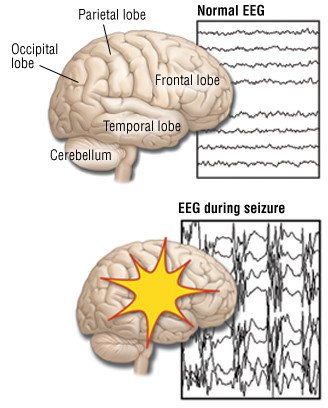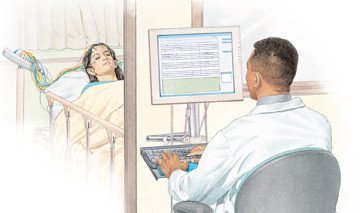Partial Seizures (Focal Seizures)
What are Partial Seizures (Focal Seizures)?

Nerve cells in the brain pass signals among themselves using both electrical current and chemicals. In a seizure, the brain's electricity is not passed in an organized way from one cell to the next, but spreads over a cluster of cells or the whole brain all at once. When only a portion of the brain is involved, the seizures are called partial seizures or focal seizures. These seizures vary tremendously in their effects on the person's movement, sensation or behavior depending on which area of brain is involved.
|
|
Some partial seizures are associated with a change in consciousness, even though the person might appear to be awake and his or her eyes may be open. In this type of seizure, called a complex partial seizure, the affected person is unaware of the people nearby during the event, is not aware of his or her own movements or behaviors during the seizure, and does not remember the seizure after it occurs. When the person having a partial seizure is aware of having a seizure, is aware of his or her surroundings and remembers the event afterward, the seizure is classified as a simple partial seizure.
Sometimes a seizure may begin as a partial seizure but change part way through the event to involve the whole brain in the seizure activity, ending with arm and leg movements on both sides and loss of consciousness. When this happens, it is called a generalized seizure. A person who has seizures repeatedly is said to have epilepsy. In 70% of cases, the cause of epilepsy cannot be found. Sometimes, epilepsy can be caused by scar tissue or a brain infection that can interfere with the brain's electrical signaling. Scar tissue in the brain can be caused by head injury, tumor, stroke or surgery.
Symptoms
A partial seizure can imitate any type of behavior or sensation that the brain can cause, depending on the part of the brain that the seizure activates. Seizures tend to occur in the same area of brain over and over, so symptoms in one person seem very similar from one time to the next. Examples of the symptoms of partial seizures include:
- Abrupt jerking muscle movements in an arm or leg
- Chewing or other mouth or tongue movements, or pulling or fumbling with clothing without a purpose
- A blank stare with no apparent awareness of one's surroundings
|
|
- A sudden feeling of fear, joy or rage that comes without reason
- Repeating a phrase or word
- A change in vision or a hallucination (seeing something that is not real)
- A sensation of smell or taste, usually unpleasant, that does not come from a real object or food
- Sudden loss of balance or dizziness
After a seizure, a person may be disoriented for a few minutes.
Diagnosis
Partial seizures can be difficult to diagnose with certainty because they vary so much from one person to another. It is helpful for the doctor to hear a detailed description from the person who is experiencing the events and from people who have seen them occur. The doctor will also review medical history of problems that can result in brain injury, including brain injury before or during birth. A physical examination with testing of neurological function will check for evidence of brain disease or brain injury that could result in seizures.
Usually the brain's electrical activity pattern is tested with an electroencephalogram (EEG) to see if any areas of the brain are conducting electricity in an abnormal way. If the EEG is abnormal, it can confirm suspicions that seizures are occurring. A normal EEG is much less helpful, since many patients with seizures that keep returning have normal EEGs in between events.
|
|
If seizures are suspected, a brain scan—preferably a magnetic resonance imaging (MRI) scan—will be used to check for scar tissue or structural abnormalities in the brain that could be causing the seizures.
Expected Duration
A seizure usually lasts no longer than a minute or two. Seizures lasting longer than five minutes require emergency medical attention. Confused thinking may follow a seizure, and this can last for several minutes.
Prevention
If you have epilepsy, the best way to prevent seizures is to take prescribed seizure medicines without missing doses. You should also get enough sleep each night, don't fast and avoid drinking too much alcohol. Even when medicine is working well, however, some seizures cannot be prevented.
If you have seizures, even if you are taking medication, you should avoid driving a motor vehicle until seizures are completely controlled. Sometimes it is reasonable to resume driving after discussion with a physician if you have not had seizures for several months. Driving restrictions for people with seizures vary in the United States from state to state.
Treatment
A variety of medicines can be used on a long-term basis to prevent seizures or decrease their frequency. Two of the most commonly used medicines to treat partial seizures are carbamazepine (Tegretol and other brand names) and lamotrigine (Lamictal).Other choices include valproate (Depakote), oxcarbazepine (Trileptal), gabapentin (Neurontin) and topiramate (Topamax). Seizure medicines require close supervision by a doctor, so that the dose can be adjusted as needed and side effects monitored. If you are treated with an anti-seizure medicine, do not stop taking the medicine abruptly, because seizures can be triggered by this sudden withdrawal.
When To Call a Professional
If you are experiencing periodic episodes that could be seizures, you should be evaluated by a doctor. If you are a woman who is considering pregnancy, discuss your seizure history and your medications with your doctor before attempting to get pregnant.
If you witness another person having a partial seizure, it is not necessary to call a doctor right away. You can take the following steps:
- Keep the person safe by removing sharp or hot objects from reach.
- Guide the person away from traffic.
- Reassure others nearby if you know that the person is having a seizure, so that they can understand the situation.
- If the person is agitated, stay a safe distance away.
- If the person has strong, sudden body movements and is lying down, place a cushion or folded clothing under the head. Roll the person onto one side to prevent him or her from choking.
- Do not place any objects into the person's mouth.
- If the person is confused when the seizure ends, explain what happened in a calm voice.
A seizure that continues for more than five minutes may not stop easily on its own and can become a medical emergency. Seizures are also more worrisome in pregnant women or in people with diabetes. In these cases, call immediately for advice.
Prognosis
If you have epilepsy and it is not caused by a treatable condition, such as infection, your tendency to have seizures may be life-long and may require long-term treatment with medicines. Children with partial seizures frequently stop having seizures as they grow older and may not require continuing treatment.
Additional Info
Epilepsy Foundation
4351 Garden City Drive
Landover, MD 20785-7223
Toll-Free: 1-800-332-1000
http://www.efa.org/
American Academy of Neurology (AAN)
1080 Montreal Ave.
St. Paul, MN 55116
Phone: 651-695-2717
Toll-Free: 1-800-879-1960
Fax: 651-695-2791
https://www.aan.com/
Further information
Always consult your healthcare provider to ensure the information displayed on this page applies to your personal circumstances.



